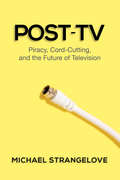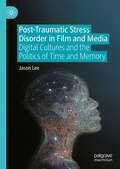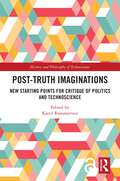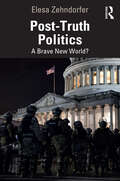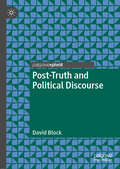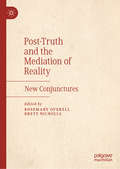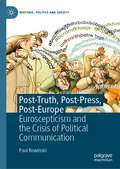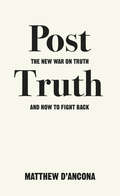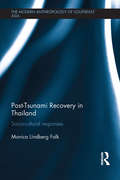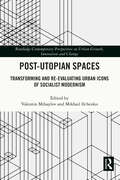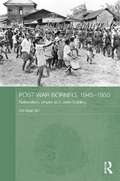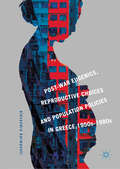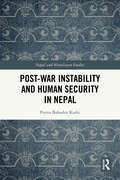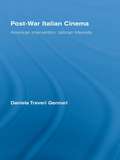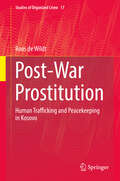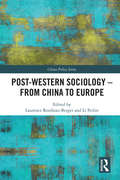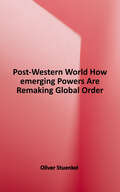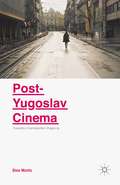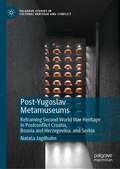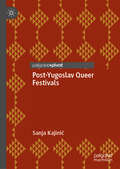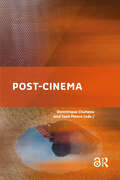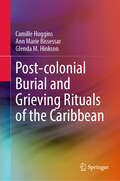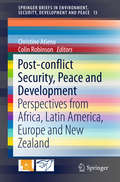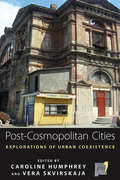- Table View
- List View
Post-TV
by Michael StrangeloveIn the late 2000s, television no longer referred to an object to be watched; it had transformed into content to be streamed, downloaded, and shared. Tens of millions of viewers have "cut the cord," abandoned cable television, tuned into online services like Netflix, Hulu, and YouTube, and also watch pirated movies and programmes at an unprecedented rate. The idea that the Internet will devastate the television and film industry in the same way that it gutted the music industry no longer seems farfetched. The television industry, however, remains driven by outmoded market-based business models that ignore audience behaviour and preferences.In Post-TV, Michael Strangelove explores the viewing habits and values of the post-television generation, one that finds new ways to exploit technology to find its entertainment for free, rather than for a fee. Challenging the notion that the audience is constrained by regulatory and industrial regimes, Strangelove argues that cord-cutting, digital piracy, increased competition, and new modes of production and distribution are making audiences and content more difficult to control, opening up the possibility of a freer, more democratic, media environment.A follow-up to the award-winning Watching YouTube, Post-TV is a lively examination of the social and economic implications of a world where people can watch what they want, when they want, wherever they want.
Post-Traumatic Stress Disorder in Film and Media: Digital Cultures and the Politics of Time and Memory
by Jason LeeThis book expounds how post-traumatic stress disorder (PTSD) became so ubiquitous. The relationships between trauma, memory, and media, including the cultural, psychological, and social dimensions of PTSD are analysed. This work provides an examination of PTSD across diverse cultural contexts, shedding light on its profound impact on human experience and societal structures. This work addresses the role of social media internationally, the pornography industry, and conspiracy theories, in perpetuating trauma and shaping societal attitudes. From feature films, including Apocalypse Now, The Deer Hunter, and Jacob’s Ladder, to hit television shows such as the BBC’s Bodyguard, visual cultures have been instrumental in popularizing an understanding of PTSD. Often these are traditional “triumph over adversity” narratives. In others what is relevant is the wider postwar political landscape. Controversial wars have led to mental health problems for returning soldiers, depicted as part of a metaphoric wound for a nation. At its heart, America is concerned with the survival of the fittest, a Social Darwinist creed fused with manifest destiny and turbo capitalism. Any weaknesses, such as mental problems including PTSD, contradicted and challenged the essence of the pioneering American spirit. A book on PTSD at this moment is necessary, as the subject has become popularized and politicized, just as “madness” became a term to define an era. Through advocating for interdisciplinary approaches to foster healthier perspectives and support, here we come to a deeper understanding of how digital cultures have impacted the politics of time and memory.
Post-Truth Imaginations: New Starting Points for Critique of Politics and Technoscience (History and Philosophy of Technoscience)
by Kjetil RommetveitThis book engages with post-truth as a problem of societal order and for scholarly analysis. It claims that post-truth discourse is more deeply entangled with main Western imaginations of knowledge societies than commonly recognised. Scholarly responses to post-truth have not fully addressed these entanglements, treating them either as something to be morally condemned or as accusations against which scholars have to defend themselves (for having somehow contributed to it). Aiming for wider problematisations, the authors of this book use post-truth to open scholarly and societal assumptions to critical scrutiny. Contributions are both conceptual and empirical, dealing with topics such as: the role of truth in public; deep penetrations of ICTs into main societal institutions; the politics of time in neoliberalism; shifting boundaries between fact – value, politics – science, nature – culture; and the importance of critique for public truth-telling. Case studies range from the politics of nuclear power and election meddling in the UK, over smart technologies and techno-regulation in Europe, to renewables in Australia. The book ends where the Corona story begins: as intensifications of Modernity’s complex dynamics, requiring new starting points for critique.
Post-Truth Politics: A Brave New World?
by Elesa ZehndorferIn recent years, rapid innovations in generative AI and social media technologies have enabled fake news to explode across our social media accounts and TV screens.Post-truth political content now routinely manipulates our realities, microtargeting us, exploiting our desires and turning our fears against us. It is an age where politics runs on emotion, not cognition, and where the democratization of disinformation has spawned a whole new global industry of disinformation entrepreneurs. It has amplified polarization, using hate, anger and fear as its oxygen.Fake news continues to bolster levels of right-wing populism not seen since the 1930s. If left unchallenged, it will continue to place its jackboot ever harder against the upturned face of democracy.Post-Truth Politics: A Brave New World? empowers voters to fight back. It provides, for the first time, a complete view of the global disinformation ecosystem: who is targeting us, how we are microtargeted, and which evolutionary, technological, marketing, neurological and military approaches are being used to manipulate us.This non-partisan book will resonate with all supporters of democracy (conservative, liberal, centrist), alongside academics in fields as diverse as media studies, sociology, politics, marketing, military studies and creative writing.
Post-Truth and Political Discourse
by David BlockIn this book David Block draws on analytical techniques from Critical Discourse Studies to critically investigate truth, truths, the propagation of ignorance and post-truth. Focusing on corrupt discourses and agnotology, he explores the role of anti-intellectualism, emotion and social media in the cultural creation, legitimisation and dissemination of ignorance. While encompassing analysis of discourses on Donald Trump, Brexit, climate change and the Alt-Right, Block furthers our understanding of this global phenomena by providing a revealing analysis of political communications relating to corruption scandals involving the Spanish conservative party. Through an innovative theoretical framework that combines critical discourse and discourse historical approaches with nuanced political analysis, he uncovers the rhetorical means by which esoteric truths and misleading narratives about corruption are created and demonstrates how they become, in their turn, corrupt discourses. This original work offers fresh insights for scholars of Discourse Analysis, Sociolinguistics, Politics, Cultural and Communication Studies, and will also appeal to general readers with an interest in political communication and Spanish politics.
Post-Truth and Political Discourse
by David BlockIn this book David Block draws on analytical techniques from Critical Discourse Studies to critically investigate truth, truths, the propagation of ignorance and post-truth. Focusing on corrupt discourses and agnotology, he explores the role of anti-intellectualism, emotion and social media in the cultural creation, legitimisation and dissemination of ignorance. While encompassing analysis of discourses on Donald Trump, Brexit, climate change and the Alt-Right, Block furthers our understanding of this global phenomena by providing a revealing analysis of political communications relating to corruption scandals involving the Spanish conservative party. Through an innovative theoretical framework that combines critical discourse and discourse historical approaches with nuanced political analysis, he uncovers the rhetorical means by which esoteric truths and misleading narratives about corruption are created and demonstrates how they become, in their turn, corrupt discourses. This original work offers fresh insights for scholars of Discourse Analysis, Sociolinguistics, Politics, Cultural and Communication Studies, and will also appeal to general readers with an interest in political communication and Spanish politics.
Post-Truth and the Mediation of Reality: New Conjunctures
by Rosemary Overell Brett NichollsOur contemporary moment is preoccupied with arbitrating ‘reality’. With the spectre of buzzwords like ‘fake news’ and ‘post-truth’ we find a scramble to locate or fix some sort of universal ‘real’ beneath what are positioned as ‘fake’ articulations. To engage with this crisis, this collection argues for the importance of a new conjuncture in communication and cultural studies of media. Building on Hall’s understanding of ‘conjuncture’ as a way of grasping moments within hegemonic struggle, the essays suggest that the current moment requires a revitalization of the concept of conjuncture.
Post-Truth, Post-Press, Post-Europe: Euroscepticism and the Crisis of Political Communication (Rhetoric, Politics and Society)
by Paul RowinskiThis book explores whether a beleaguered press in recent years has been developing an emotive, Eurosceptic post-truth rhetoric of its own – competing for attention with populist politicians. These politicians now by-pass the media, talking directly to their publics in blogs, on Twitter and Facebook. In the post-truth age, objective facts are less influential in shaping opinion than appeals to emotion. Audiences congregate around views they share and want to believe. The author presents a critical discourse analysis of the language used by populist politicians online, on Facebook, and subsequently quoted in the press, which highlights how the political rhetoric of Italian and British politicians is often at its most inflammatory around the issue of immigration. The same goes for the press. The Italian case study focuses on media coverage of the 2014 and 2019 European elections and 2018 general election. The British case study examines press reporting of the 2016 UK referendum on EU membership, the 2017 general election, and the September 2019 parliamentary debate immediately following the UK Supreme Court ruling that proroguing of Parliament was illegal. From the picture that emerges, the author argues that journalists need to change how they report, to challenge the post-truthers, holding them to account and pressing them on the facts while also harnessing the emotions of disaffected publics.
Post-Truth: The New War on Truth and How to Fight Back
by Matthew d'AnconaWelcome to the Post-Truth era— a time in which the art of the lie is shaking the very foundations of democracy and the world as we know it. The Brexit vote; Donald Trump’s victory; the rejection of climate change science; the vilification of immigrants; all have been based on the power to evoke feelings and not facts. So what does it all mean and how can we champion truth in in a time of lies and ‘alternative facts’?In this eye-opening and timely book, Post-Truth is distinguished from a long tradition of political lies, exaggeration and spin. What is new is not the mendacity of politicians but the public’s response to it and the ability of new technologies and social media to manipulate, polarise and entrench opinion. Where trust has evaporated, conspiracy theories thrive, the authority of the media wilt and emotions matter more than facts . Now, one of the UK’s most respected political journalists, Matthew d’Ancona investigates how we got here, why quiet resignation is not an option and how we can and must fight back.
Post-Tsunami Recovery in Thailand: Socio-cultural responses (The Modern Anthropology of Southeast Asia)
by Monica Lindberg FalkOf all the huge natural disasters that claimed the lives of thousands in Asia, the Indian Ocean tsunami in 2004 was the largest, estimated to have killed more than 230,000 people. The scope of damage brought about by this natural disaster urges focus on recovery and post-disaster reconstruction from several perspectives. Here we find an in-depth ethnography of Thailand and the role of culture and religion as an underpinning issue in post-disaster recovery. Following the post-tsunami recovery over five years, the book provides knowledge on socio-cultural responses from affected local communities after natural hazards, and is based on original material collected in Thailand after the 2004 tsunami. With a focus on how culture and religion interplay in the processes of building resilience and decreasing vulnerability, it gives a deeper understanding of how disasters are experienced and dealt with on a local level. It examines survivors’ experiences of rituals and ceremonies that became a part of the survivors’ lives in new ways after the tsunami, offering psychological reassurance and religious efficaciousness as well as communication links between themselves and the deceased. Using observations, narratives and material from in-depth interviews with survivors, relatives, relief workers, officials and Buddhist monks and nuns, this book contributes to the research on anthropology of disaster and to the development of research on cultural resilience and religion in post-disaster recovery. It will be of interest to scholars of Disaster Studies, Buddhist Studies and Asian Studies.
Post-Utopian Spaces: Transforming and Re-Evaluating Urban Icons of Socialist Modernism (Routledge Contemporary Perspectives on Urban Growth, Innovation and Change)
by Valentin Mihaylov Mikhail IlchenkoFeaturing up-to-date and insightful analyses and comparative case studies from a plethora of countries, this timely book explores ‘ideal’ socialist cities and their transformation under new socio-economic and political conditions after the fall of communism. With contributions from leading scholars in the field, this book prioritises objective scientific knowledge and presents expert rethinking of the historical experience of urban planning in the former socialist countries of Eurasia. It draws on carefully selected examples of iconic cities of socialist modernism, from the post-Soviet space, Central Europe, and the Balkans. The book explores the ongoing transformation of these cities: from uniformed urban environment to chaotic post-modernist planning, from industrialisation to touristification, from deideologisation to making new and still highly contested heritage. Written in an accessible and engaging style, this book will be of interest to students and scholars in urban studies, human geography, sociology, social anthropology, spatial planning, and architectural practice.
Post-War Borneo, 1945-1950: Nationalism, Empire and State-Building (Routledge Studies in the Modern History of Asia)
by Ooi Keat GinThis book examines Borneo, both British Borneo – Brunei, Sarawak and North Borneo – and Dutch Borneo in the period 1945-1950. Borneo then was at the crossroads. Following the Japanese Occupation, the likely future status of the various Bornean territories was not at all clear, and the book discusses the various factions and powers, both local and international, who were contending for control in this period. It examines the effects of the Japanese surrender, the impact of the subsequent interregnum and Australian and British military administrations, the reassertion of Dutch control, the struggle for Indonesian independence, and movements for local autonomy, reassertion of ethnic rights, interests and identity. It charts developments throughout this volatile and uncertain period, up to the point at which the newly independent Republic of Indonesia emerged and a more settled period began.
Post-War Eugenics, Reproductive Choices and Population Policies in Greece, 1950s–1980s
by Alexandra BarmpoutiThis book sheds light on the history of Greek eugenics during the post-war period. At this time, eugenics had already been condemned by international declarations. Alexandra Barmpouti, however, challenges the assumption that eugenics disappeared and confirms the continuity of eugenics after the Second World War. She looks at the Greek paradigm because it included the establishment of a eugenics society in 1953 and revealed the contact of Greek eugenicists with renowned British and American birth control advocates. The book covers for the first time the untold history of contraception in Greece during the 1950s and 1960s when the use of female contraceptives was forbidden. It thus argues that birth control was ideologically based on eugenics. In the same context, the book discusses significant breakthroughs related to eugenics, such as the rise of the feminist movement and the advance of human genetics that took place during this period.
Post-War Instability and Human Security in Nepal (Nepal and Himalayan Studies)
by Purna Bahadur KarkiThis book studies post-war instability in Nepal and its effect on human security. It looks at Nepal’s Maoist People’s War, the Nepali peace-building process, and political development in Nepal. Drawing on in-depth interviews, the book discusses multiple issues of the peace-building process, including education, health, economics, income, gender inequality, human rights, and the sociopolitical inclusion of marginal people and backward communities. The author also explores the relationship between peace-building and the broader concept of freedom, examining factors that affect Nepali determination.The book will be useful for students and researchers of politics, peace and conflict studies, sociology, development studies, strategic and security studies, contemporary history, international relations, Nepal studies, and South Asian studies.
Post-War Italian Cinema: American Intervention, Vatican Interests (Routledge Advances in Film Studies)
by Daniela Treveri GennariThrough a comparative approach of current theories developed on ideology and an analysis of official documents from the Vatican and the United States Department of State, the book investigates the decisive role that American production companies played in the development of the Italian film industry and their links to the Vatican. This analysis evaluates how the Italian production and distribution industries satisfied the American political and economic interests. American political and cultural ideology of the post-1945 era, is compared with the Roman Catholic ideology in order to assess their cultural propaganda. This is followed by studies of the roles played by key individuals, such as Giulio Andreotti, and institutions such as ANICA and A.G.I.S. involved in formulating the policies and regulations that affected the production and distribution of American and Italian films in the post-1945 era, as well as the involvement of the Roman Catholic Church in this process.
Post-War Prostitution: Human Trafficking and Peacekeeping in Kosovo (Studies of Organized Crime #17)
by Roos de WildtAmidst ongoing allegations of inappropriate behavior and trafficking during UN peacekeeping missions, this volume takes a step back to analyze the post-war and peacekeeping contexts in which prostitution flourishes.Using ethnographic research conducted in Kosovo from 2011 to 2015, this book offers an alternate understanding of the growth of the sex industry in the wake of war. It features in-depth interviews with the diverse women engaged in prostitution, with those facilitating it, and with police, prosecutors, and gynecologists. Drawing on the perspectives of women engaged in prostitution in the wake of war, this volume argues that the depiction of these women as victims of trafficking in the hegemonic discourse does more harm than good. Instead, it outlines the complex set of circumstances and choices that emerge in the context of a growing post-war sex economy.Extrapolating the conclusions from the study of Kosovo, this book is a valuable resources for researchers and practitioners studying the aftermath of war in the Balkans and beyond, and researchers engaged with the function of the UN and peacekeeping missions internationally.
Post-Western Sociology - From China to Europe (China Policy Series)
by Li Peilin Laurence Roulleau-BergerThis book is rooted in an epistemological approach to sociology in which the boundaries between Western and non-Western sociologies are acknowledged and built on. It argues that knowledge is organised in conceptual spaces linked to paradigms and programmes which in turn are linked to ethnocentred knowledge processes; that until recently Western approaches, including Post-Colonial, French Social Science and American approaches, have dominated non-Western theories; and that Western theories have sometimes seemed incapable of explaining phenomena produced in other societies. It goes on to argue that the blurring of boundaries between Western and non-Western sociologies is very important; and that such a Post-Western approach will mean co-production and co-construction of common knowledge, the recognition of ignored or forgotten scientific cultures and a "global change" in sociology which imposes theoretical and methodological detours, displacements, reversals and conversions. The book brings together a wide range of Western and Chinese sociologists who explore the consequences of this new approach in relation to many different issues and aspects of sociology.
Post-Western World: How Emerging Powers are Remaking Global Order
by Oliver StuenkelWith the United States' superpower status rivalled by a rising China and emerging powers like India and Brazil playing a growing role in international affairs, the global balance of power is shifting. But what does this mean for the future of the international order? Will China dominate the 21st Century? Will the so-called BRICS prove to be a disruptive force in global affairs? Are we headed towards a world marked by frequent strife, or will the end of Western dominance make the world more peaceful? <p><p>In this provocative new book, Oliver Stuenkel argues that our understanding of global order and predictions about its future are limited because we seek to imagine the post-Western world from a parochial Western-centric perspective. Such a view is increasingly inadequate in a world where a billions of people regard Western rule as a temporary aberration, and the rise of Asia as a return to normalcy. In reality, China and other rising powers that elude the simplistic extremes of either confronting or joining existing order are quietly building a "parallel order" which complements today's international institutions and increases rising powers' autonomy. Combining accessibility with expert sensitivity to the complexities of the global shift of power, Stuenkel's vision of a post-Western world will be core reading for students and scholars of contemporary international affairs, as well as anyone interested in the future of global politics.
Post-Yugoslav Cinema: Towards a Cosmopolitan Imagining
by Dino MurticDrawing primarily on selected filmic texts from former-Yugoslavia, the book examines key social and political events that triggered the Yugoslav wars in the 1990s. Yugoslav politics and society are set within the broader artistic and cinematic strategies that helped stabilise post-Yugoslav territories strategies that were part of the national desire of looking forward to a time of 'perpetual peace' and its subsequent cosmopolitan norms. It argues that filmic texts demonstrate the degree to which nationalism was at the heart of the violent disintegration of Yugoslavia. Yet, the concern of the argument is not simply to offer a filmic critique but to develop an alternative to nationalism; namely, a theoretical framework through which cosmopolitan humanism is at the forefront of addressing former Yugoslavia's political wounds.
Post-Yugoslav Metamuseums: Reframing Second World War Heritage in Postconflict Croatia, Bosnia and Herzegovina, and Serbia (Palgrave Studies in Cultural Heritage and Conflict)
by Nataša JagdhuhnThis book analyzes how Second World War heritage is being reframed in the memorial museums of the post-socialist, post-conflict states of Croatia, Bosnia and Herzegovina, and Serbia. It argues that in all three countries, a reluctance to confront undesirable parts of their national histories is the root cause explaining why the state-funded Second World War memorial museums remain stuck in the postsocialist transition. In most cases, Second World War museums, exhibitions, and displays conceived in the Yugoslav period have been left unchanged. However, there are also examples where new sections were added to the old ones and there are a small number of completely reconceptualized permanent exhibitions. The transitional position of the Second World War museums has made it possible to view these institutions as historical formations in their own right. The book will appeal to students and academics working in the fields of heritage and museums studies, memory studies, and cultural history of Southeast-Europe.
Post-Yugoslav Queer Festivals
by Sanja KajinićThis book explores two festivals over ten years: Queer Zagreb and Ljubljana Gay and Lesbian Film Festival. Kajinić focuses on the festivals’ participation in a regional network of queer festivals and provides an insight into how these festivals and their audiences negotiated the limits of non-normativity in particularly intensive ways between 2002-2012. By offering an interdisciplinary perspective and exploring the possibilities of critical visual methodology, the author relates the history of these important cultural projects and their organizational practices to the ways in which they impacted the lives of their participants.Post-Yugoslav Queer Festivals will be of interest to readers studying the region of Southeast Europe from a range of perspectives including gender studies, history, politics and festival studies.
Post-cinema: Cinema in the Post-art Era (The Key Debates: Mutations and Appropriations in European Film Studies)
by Dominique Chateau and José MourePost-cinema designates a new way of making films. It is time to ask whether this novelty is complete or relative and to evaluate to what extent it represents a unitary or diversified current. The book proposes to integrate the post-cinema question within the post-art question in order to study the new ways of making filmic images. The issue will be considered at three levels: the impression of post-art on regular films; the relocation (Casetti) of the same films that can be seen using devices of all kinds in conditions more or less removed from the dispositif of the theater; the integration of cinema into contemporary art in all kinds of forms of creation and exhibition, parallel to the integration of contemporary art in regular cinema.
Post-colonial Burial and Grieving Rituals of the Caribbean
by Ann Marie Bissessar Camille Huggins Glenda M. HinksonThis book brings together anthropological and historical studies that analyze burial rituals within the Caribbean through the theoretical lens of syncretism and the hybridization of post-colonial and contemporary time periods. Based on oral historiography, historical document analysis and ethnographic interviews, the chapters in this volume outlay the creolization of ancestral burial rituals in the wider Caribbean and present case studies of eight Caribbean countries: Barbados, Haiti, Grenada, Guyana, Suriname, St. Lucia, St. Vincent and Trinidad and Tobago. This contributed volume is edited by scholars from different disciplines such as social work, psychology, and political science, providing an interwoven lens of individual human, political and environmental contexts. Contributing authors are from diverse disciplines such as anthropology, communications, sociology, political science, social work, and psychology and each discipline approaches the subject matter through their perspective lenses. Each chapter analyzes the hybridity of the burial rituals in the construction of culture and identity within conditions of colonial antagonism and inequity and is rich with oral histories from lay community historians, firsthand accounts, and historical texts. Post-colonial Burial and Grieving Rituals of the Caribbean will be of interest to scholars of cultural and religious anthropology, history and sociology, as it highlights the importance of grief and shows how it is encapsulated into burial traditions that are transmitted intergenerationally and express important aspects of Caribbean cultures.
Post-conflict Security, Peace and Development: Perspectives From Africa, Latin America, Europe And New Zealand (Springerbriefs In Environment, Security, Development And Peace Ser. #13)
by Christine Atieno Colin RobinsonThis book examines links between post-conflict security, peace and development in Africa, Latin America, Europe and New Zealand. Young peace researchers from the Global South (Uganda, Ivory Coast, Kenya, Brazil, Colombia) as well as from Italy and New Zealand address in case studies traumas in Northern Uganda, demobilisation and reintegration of ex-combatants in the Ivory Coast, economic and financial management of terrorism in Kenya, organised crime in Brazil, mental health issues in Colombia, macro realism in Europe and global defence reforms within the military apparatus since 1990. The book reviews linkages between regional stability, development and peace in post-conflict societies while adding on to the post 2015 international agenda and discusses linkages between peace, security and development.
Post-cosmopolitan Cities
by Caroline Humphrey Vera SkvirskajaExamining the way people imagine and interact in their cities, this book explores the post-cosmopolitan city. The contributors consider the effects of migration, national, and religious revivals (with their new aesthetic sensibilities), the dispositions of marginalized economic actors, and globalized tourism on urban sociality. The case studies here share the situation of having been incorporated in previous political regimes (imperial, colonial, socialist) that one way or another created their own kind of cosmopolitanism, and now these cities are experiencing the aftermath of these regimes while being exposed to new national politics and migratory flows of people.
